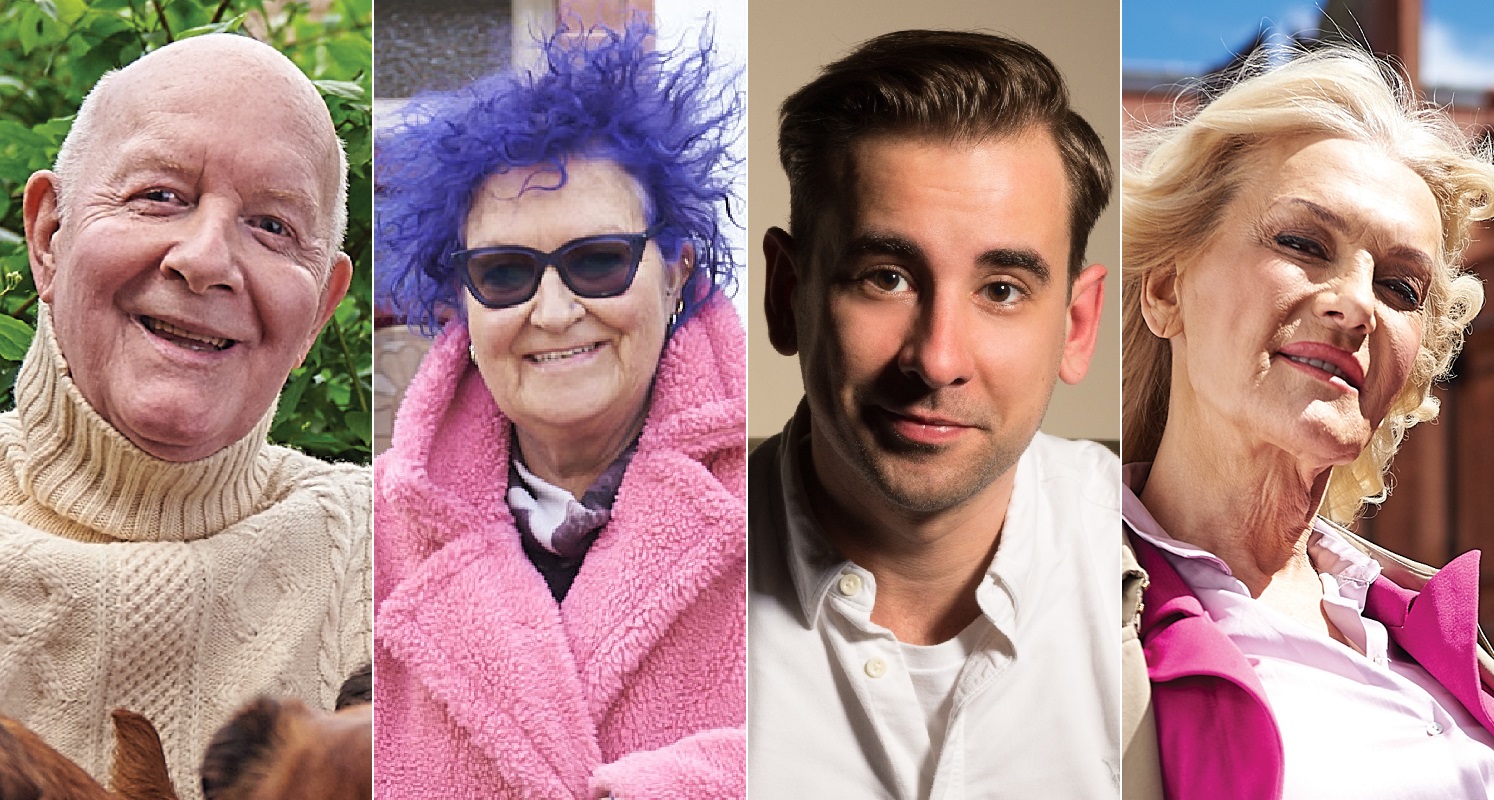The legacy of the HIV/Aids crisis: LGBTQ people share stories of tragedy and triumph
Four individuals whose lives have been impacted by HIV/Aids open up in the Attitude July issue.

Words: Thomas Stichbury
In the wake of It’s a Sin, Russell T Davies’s powerful TV drama starring Olly Alexander, there has been renewed public interest in and conversation around the HIV/Aids crisis of the 80s and 90s.
Joining forces with the National HIV Story Trust, a charity set up to ensure the history of the pandemic is not forgotten, we capture the stories of four individuals whose lives have been shaped by HIV/Aids.
In the Attitude July issue, out now to download and to order globally, they discuss their experiences, the importance of remembering the past and honouring the generations of predominantly gay men lost to the devastating disease, and the stigma that – despite the incredible advancements in HIV treatment – remains to this day.
Flick – the lesbian nurse who cared for the dying
Flick Thorley, 57, worked as a HIV specialist nurse at University College Hospital, London Lighthouse – the centre and hospice visited by Princess Diana – and, later, Chelsea and Westminster Hospital.
Photography: Luxxxer
“We’d have, say, two live patients to look after and two dead patients to look after. That would entail going down into the mortuary and getting them out of the fridge and putting them in the viewing room for their partners and friends and families. Until antiretrovirals, we would have as many dead patients as live ones per shift.”
“One of the things we always used to do at the Lighthouse (I think we did at Chelsea as well), whenever anybody died, we opened a window to, like, let the spirit out. Most of us weren’t religious, and a lot of us weren’t even spiritual, but there were certain things that you just can’t deny, and one is feeling somebody’s spirit or energy leave the room when you’re with their body.”
“[There was a gay couple at the Lighthouse], one of them was dying and the other wasn’t dying yet. We knew one of them was going to die that night and I was sitting in there with him and holding his hand and talking. His partner was in the bed across the room, but he was too ill; he couldn’t get out of bed or anything. The boyfriend died and I said to his partner, ‘He’s gone.’ He broke down sobbing and I went and sat with him and I thought, f**king hell, this is such a precious privilege to be able to do this for people.”
“The fact that science has brought the situation where, if people take PrEP, and if people with HIV take their ART [antiretroviral therapy] and are undetectable, they can’t transmit HIV, it’s like magic. But with that freedom, there is a responsibility, because there is a whole history, a family history. It’s important that people understand the backstory.”
George – the long-term HIV survivor
Self-proclaimed “warrior queen” and artist George Hodson, 70, lost his soulmate Sam to Aids and has also fought four different cancers.
He spent two years in San Francisco as a young gay man, but is now based in London with his beloved Belgian Griffons.

Photography: Luxxxer
“I live in wretched poverty, I’m very frail and I’m afraid my voice is getting forgotten because, without people like me, there wouldn’t be ART. I know we don’t make cover stories, us old wrinklies, but I encapsulate gay history. I can tell my story and remind our young brothers and sisters.”
“We were passing in the Castro, a pharmacy, there was a Polaroid taped to the window; it was a close-up of a man’s arm with this bruised, purple lesion [Kaposi’s sarcoma], and underneath it said: ‘If anyone has got this, please report to the Gay Men’s Health Club.’ That was the first time I visually saw anything.”
“[Sam] died in my arms in the hospital… I tried to get my breath rate in harmony with his, and I told him in his ear: ‘It’s time to go.’ I suddenly realised that people were leaving the room and that he’d stopped breathing. I lay with him and just opened myself up and took him in. I still have him.”
“We’re getting to the point, with the Aids epidemic, where the younger folk need reminding that our elders are important and valid, and we must celebrate them.”
Andrew – the Section 28 generation
Theatre producer and director Andrew Keates, 35, found out he was HIV positive whilst staging a production of William M. Hoffman’s As If – after making a ‘pact’ with his company that everybody involved would take a test. Andrew is also an HIV awareness ambassador.

Photography: Scott Rylander
“I was reading a play called Bent by Martin Sherman, who is now my mentor. I read the final page and woke my mum up at five in the morning with a cigarette; I thought, if I’m going to tell her I’m gay, I might as well tell her I smoke as well. I gave her a letter saying I’m gay and she put her arm around me and said, ‘I love you.’ But she also said that night, ‘I just hope you don’t get Aids.’”
“I was teaching at a children’s stage school and I used to borrow the piano to teach the kids; the piano belonged to the owner of the school and he had a daughter and his wife used to be involved in the school as well. One day, I left the studio and I’d forgotten my scarf. I legged it back and the boss’s wife was there desperately cleaning the piano after I’d used it. I asked, ‘Why are you doing that?’ She was, like, ‘Oh, you know, it’s dirty.’ I replied, ‘No, it wasn’t, and neither am I.’ I walked out, never returned.”
“As a 35-year-old, all this talk about, you know, we’re so much better educated, but you only need to look a few days ago at my Twitter feed, where somebody asked me, ‘Have you got Aids?’ Sometimes it’s exhausting. Whilst I’m really proud of the work I do, I’m just a guy and if it’s been a day and I’m a bit tired; it happens all the time, where I’ll be out for a few drinks and someone makes an Aids joke. You go, what’s the f**king point?”
“As horrendous as the 80s and 90s was, it’s operatic, it’s romantic, and gay men are attracted to stories of the dramatic. The problem with HIV today is, that story is not operatic, it’s actually quite dull; I take a pill a day, I can’t pass it on… It’s a Sin was great, it was a lovely memorial, but where are the plots in Hollyoaks and EastEnders or whatever, which rebalance? I worry who is going to be talking about HIV today and that’s why I do the work I do.”
Rebecca – the trans activist
Diagnosed with Aids at 27, Rebecca Antoinette de Havilland experienced prejudice within the community and was forced to delay her gender confirmation surgery.
Now 62, Rebecca works at the Trans+ Gender Clinic and is the CEO of the trans initiative Project Boot Camp.

Photography: Luxxxer
“I got the okay, the letter for the operation, I think it was October ’87, but at that stage, you had to have an Aids test… I was given two years to live, and I was told that there was no way I would have my operation. On that day, my life changed forever.”
“To be a trans woman with Aids in 1987 was just… I’m sure if they were still burning witches at the stake, I would have been at the top of their list. I had nowhere to run, to hide. Even my own community used to call me the ‘Aids-ridden bitch’… I just found my world got very small. It was me versus the world for a long time.”
“I do a lot of work around women catching HIV. If you look at the statistics, most women when they get to, we’ll say, 45, 50, they’re menopausal, they’re probably divorced and their kids are in college — if young guys are hitting on [them], they’re going to feel pretty ‘Mm-hm.’ Of course, the HIV thing has been like the Concorde; it’s gone right over their head because there’s been nothing to tell them. We need to widen who we’re reaching out to.”
“HIV is not fussy – that’s my tag. It does not discriminate. It doesn’t care who you are, how rich you are, how poor you are, what colour you are, what gender you are, or what age you are. People really need to know this.”
Read the full interviews in the Attitude July issue, out now.
Subscribe in print and get your first three issues for just £1 each, or digitally for just over 1.50 per issue.

